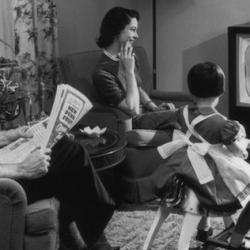Tom Wolfe has a fascinating sketch of the life and work of Marshall McLuhan in the Spring 2004 issue of The Wilson Quarterly . McLuhan converted to Catholicism during his studies, and Wolfe suggests that McLuhan’s greatest inspiration was a hidden one, Teilhard de Chardin . Wolfe writes, “Regardless of what anybody thought of [Teilhard’s] theology, the man’s powers of prediction were astonishing. He died in 1955, when television had nly recently come into widespread use and the microchip had not even been invented. Computers were huge machines, big as a suburban living room, that were not yet in assembly-line production. But he was already writings about ‘the extraordinary network of radio and television communication which already links us all in a sort of “etherised” human consciousness,’ and of ‘those astonishing electronic computers which enhance the “speed of thought” and pave the way for a revolution in the sphere of research.’ Ths technology was creating a ‘nervous system for humanity,’ he wrote, ‘a single, organized unbroken membrane over the earth,’ a ‘stupendous thinking machine.’ ‘The age of civilization has ended, and that of one civilization’ ?Ehe underlined ‘one civilization’ – ‘is beginning.’ That unbroken membrance, that noosphere, was, of course, McLuhan’s ‘seamless web of experience.’ And that ‘one civilization’ was his ‘global village.’” McLuhan avoided mentioning Teilhard’s influence publicly, Wolfe suggests, because there were questions about Teilhard’s orthodoxy, and because secular social scientists would have looked askance at McLuhan’s work if he had revealed the theological inspirations behind it.















